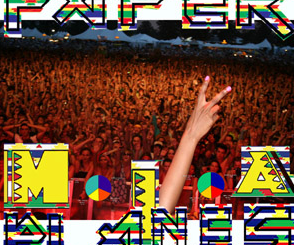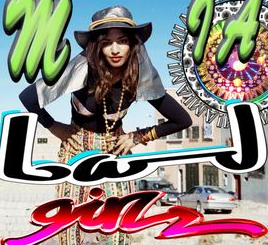Hombre by M.I.A. Lyrics Meaning – Decoding Cultural Intersection in Music
Lyrics
Me leaga-you teaser
Leaga para min,
Please sin
Excuse me little hombre
Take my number call me
I can get squeaky
So you can come and oil me
My finger tips and the lips
Do the work yeah
My hips do the flicks
As I walk yeah with a good head
I came to make it with a good head
I came to break it
Did your mama tell you
About me what she say
Don’t go play there
Gonna make that hot boy
Want me gonna make that hot boy
Take me
You can stick me
Stab me grind me or wind me
Fuck we can even ask your wifey
Rich bored at home with a kiddie
She don’t know about
You getting nookie
Member when you first started
Call me you had a ticket
Waitin’ for me
SAid you want to meet in miami
So we can start a
Family
Hoytu hoytu
Cept cept
Cinko, quadro
Tres doie
You can call me over
British-Sri Lankan artist M.I.A. is known for her unapologetic and raw lyrical prowess, weaving together global political nuances with street-smart bravado. ‘Hombre,’ from her acclaimed album ‘Arular,’ is no less a political grenade wrapped in the guise of a seductive, rhythmic beat. With its mix of languages and styles, it both disorients and intrigues, demanding a closer listen.
‘Hombre’ transcends the typical club banger’s domain with its coded language and layered meaning. M.I.A. has never been one to shy away from controversy, and this track is a bold testament to that legacy, blending issues of gender, power, immigration, and cultural identity within its bars while maintaining a catchy, danceable exterior.
Cross-Cultural Callouts: Bridging Continents in Beats
The opening lines of ‘Hombre’ serve as a linguistic tapestry, stringing together Spanish, English, and hints of Tamil—a callback to M.I.A.’s personal heritage. The song amalgamates diverse elements to communicate a message that’s both intimate and inclusive, signaling a solidarity across borders. The ‘Pi-qa,’ ‘nu-mu-ro,’ and ‘ga-ra-to,’ mimic phone keypad sounds, thus weaving technology into the very fabric of connection.
Breaking down language barriers, she seems to be inviting the listener into her multicultural world. This introduction serves as a subversive challenge to narrow cultural narratives—forcing the listener to consider the complexity of modern identities that are negotiated through both physical and digital spaces.
The Quirky Quintessence of M.I.A.’s Wordplay
M.I.A.’s linguistic gymnastics impart ‘Hombre’ with a sardonic wit. The playful ‘Excuse me little hombre / Take my number call me’ speaks equally to flirtation as it does to a cultural assertion, flipping gender dynamics by addressing a ‘little man.’ Through this, she’s not just playing with words or flirting, but also with the power structures in society.
The allure of the forbidden or cautionary (‘Did your mama tell you / About me what she say’) is flaunted almost as a challenge to conventional norms, tapping into the allure of the taboo. The audaciousness of these lines court attention, serving to both entertain and disarm, adding layers to the song’s narrative.
Hyper-Sexuality as a Tool of Power
‘Hombre’ is thick with sexual autonomy, showcasing M.I.A.’s control over her own desires and body. The lyrics ‘You can stick me / Stab me grind me or wind me’ might initially appear submissive, yet they brim with agency. It is M.I.A. who offers the options, directing the terms of engagement, thereby subverting the expected roles.
Through this overt sexuality, M.I.A. mocks gendered expectations, while simultaneously bringing to the fore the objectification and fetishization of women, especially women of color. She holds a mirror to societal hypocrisies, exposing the double standards and the commodification of female sexuality.
The Hidden Layers: Migratory Rhythms and Roots
The elaborate beat and the rhythmic intonation of ‘Hoytu hoytu / Cept cept’ evoke the sensation of travel, of crossing geographies. M.I.A.’s personal history as an immigrant and a survivor of political turmoil is captured in the diasporic pulse of ‘Hombre.’ The music embarks on a journey, crossing not just musical genres but also national boundaries, reflective of her own migratory experience.
These beats are carriers of hidden tales, alluding to globalization’s complex web and its impact on individual and collective stories. There’s a boldness in the song that speaks to the heart of the immigrant story; it’s about the audacity to occupy spaces and demand visibility.
Memorable Lines That Demand Reflection
‘Rich bored at home with a kiddie / She don’t know about / You getting nookie,’ is a cutting line, drawing attention to the often ignored emotional and domestic landscapes behind the facades of wealthy existences. In these words, M.I.A. spotlights the disconnect between privileged lives and the undercurrents of dissatisfaction that can define them.
The memorable lines throughout ‘Hombre’ act as provocations, each ripe for interpretation. They serve as a reminder of the dualities present within us all – the public versus the private, the exterior versus the interior. M.I.A. is not merely crafting lyrics; she’s engineering catalysts for dialogue and self-reflection.








